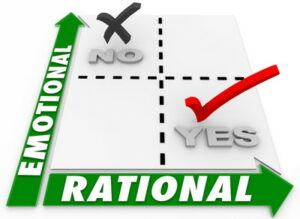 In the world of betting, people who place their wagers based on emotion will rarely win in the long-term. The truth about placing bets is that you need to do so with an entirely clear head, allowing nothing but the facts to enter your head.
In the world of betting, people who place their wagers based on emotion will rarely win in the long-term. The truth about placing bets is that you need to do so with an entirely clear head, allowing nothing but the facts to enter your head.
A good way of thinking about it is by looking at blackjack and basic strategy. Basic strategy is a way of playing the card game that reduces the House Edge to 0.5%, compared to a 2% Edge for those that don’t employ Basic Strategy. Even so, there are plenty of people that play it by ‘instinct’, increasing the House Edge as a result.
In some ways, that is the perfect comparison to emotional betting.
It is difficult enough to win a bet without effectively giving the bookmaker your money without a fight. If you succumb to the world of emotional betting, that is essentially what you’re doing. You’re allowing your feelings to override the research that you’ve done or the knowledge that you’ve picked up without even realising that you’ve done so. The likes of a player picking up an injury pre-match or their partner giving birth in the week leading up to the tournament are more important bits of information than how you feel.
How You Should Bet
 The first place to start is by looking at how you should bet, with this giving us a good sense of why how you do bet sometimes is wrong. Generally speaking, the best way of figuring out how to bet is to look at what those who bet professionally tend to do. Whilst there are one or two exceptions, the vast majority of professional gamblers will do reams and reams of research before they look to pull the trigger on their wagers. Whether they are betting on a tennis match or a football game, they will know who is injured, which players are playing well and what the stats say. They have a very good measure of how the implied odds (the odds offered by a bookie) compare to the true odds (actual probability of an outcome happening).
The first place to start is by looking at how you should bet, with this giving us a good sense of why how you do bet sometimes is wrong. Generally speaking, the best way of figuring out how to bet is to look at what those who bet professionally tend to do. Whilst there are one or two exceptions, the vast majority of professional gamblers will do reams and reams of research before they look to pull the trigger on their wagers. Whether they are betting on a tennis match or a football game, they will know who is injured, which players are playing well and what the stats say. They have a very good measure of how the implied odds (the odds offered by a bookie) compare to the true odds (actual probability of an outcome happening).
Professional gamblers are aware that sometimes their bets will go wrong, but if they stick to their method then they will win more than they lose. The key is to be able to let go of the bets that you don’t win, rather than chasing the lost money. If you’re thinking of placing a wager on a football match, for example, then the best thing you can do first of all is to look at the form of both teams. Do a bit of research to find out if there has been one player driving the success of the better team, say, or whether a team out of form has been missing their best player.
From there, you’ll be able to figure out what is likely to happen in the next match. This is also a way of discovering some value in the market, with bookmakers sometimes being slow to react to what is happening with a team. Imagine, for example, that Manchester United have won their past four matches and Manchester City have lost their four games. What you know from your research is that United have won all games by 1-0, with the goal being scored by a player that is out injured for the approaching game against City.
Man City, on the other hand, have been without their goalkeeper for the four games that they lost, as well as their main striker. Both the goalie and the forward are back for this game, so the combination of City getting their main men back and United being without their talisman means that a bet on City makes more sense than a bet on United. The bookies will most likely create their odds based on form, giving you value on the pro-City bet that might not otherwise have been there. This is the sort of thinking that professional bettors will do.
Even if the match ends in a draw or Manchester United end up winning it thanks to a late penalty or the like, it doesn’t mean that the professional punter was wrong to have placed their money on City. They will know this and will continue doing plenty of research when they’re thinking of placing a bet, putting themselves in the best possible position to win their wager. They will think in as emotionless a manner as they can, being entirely dead-eyed and focussed on the prize, rather than letting themselves get distracted by a ‘feeling’ or an ‘instinct’.
Emotional Betting Is Bad
 There are plenty of people that will constantly place bets on the team that they support, somehow feeling as though to do anything else would be a betrayal or an example of bad supporting. These people are probably the types that believe it when they sing that their side is ‘the greatest team the world has ever seen’, even though they’ve lost ten of their last 11 matches. This kind of blind loyalty is excellent for a football supporter, getting behind the team no matter what has happened, but it is terrible for a bettor hoping to make money.
There are plenty of people that will constantly place bets on the team that they support, somehow feeling as though to do anything else would be a betrayal or an example of bad supporting. These people are probably the types that believe it when they sing that their side is ‘the greatest team the world has ever seen’, even though they’ve lost ten of their last 11 matches. This kind of blind loyalty is excellent for a football supporter, getting behind the team no matter what has happened, but it is terrible for a bettor hoping to make money.
The truth is, the sensible bet for that person is to bet against their own team, but that is something that many people can’t bring themselves to do. Instead, they bury their head in the sand and imagine that their bet on their team will come good eventually, if only they could persist for long enough. This is not good betting practice and is very much not the way that our professional bettor would think. They would be dispassionate in their summary of the situation, making the call that fits the numbers and works with their research.
There is such a thing as the power of positive thinking, but it’s not as all-consuming as one might hope. Whilst thinking positively in your day to day life is one thing and can lead to good situations arising, positive thinking alone won’t be enough to help you win bets that are almost certainly going to be losers. If your team has lost ten games out of 11 and there are no mitigating circumstances, placing a bet on them to win and then thinking positively about the outcome is only really likely to see you losing your stake money on that wager.
It’s Not Just Bets On Your Team That Are Wrong
 Whilst it might seem like it, betting on a team that is probably going to lose isn’t the only incorrect form of betting that is driven by emotion. Compo bets, which is short for compensational betting, is a common practice for many people. Heading in to a big match, they will look to place bets on a number of different outcomes that they actually don’t want to happen. Bets on their team to lose, for example, or for a player to be sent off. Wagers on both teams to score can be common if a clean sheet is crucial for some reason.
Whilst it might seem like it, betting on a team that is probably going to lose isn’t the only incorrect form of betting that is driven by emotion. Compo bets, which is short for compensational betting, is a common practice for many people. Heading in to a big match, they will look to place bets on a number of different outcomes that they actually don’t want to happen. Bets on their team to lose, for example, or for a player to be sent off. Wagers on both teams to score can be common if a clean sheet is crucial for some reason.
The thinking behind this is that winning their bets will take the edge of their team losing, with money soothing the pain of defeat. Some call this ‘emotional hedging’, comparing it to fire insurance. You don’t want your house to burn down, but if it does then the insurance will take the edge of the pain of losing all of your possessions. There is very little money that people would take that would make their team losing worthwhile, but it’s still a manner of making the pain just that little bit easier to handle, even if it is poor form in betting.
This is emotional betting, it just comes in a different form to the emotional betting that sees you blinded by your love of your team. Instead of betting on your favourite team or player even though you know that they are not very good, you’re betting against them, often when you know how good they are. Both ways of betting will see you lose more money than you’ll win, which is exactly the wrong way to approach placing bets. The main question you need to ask yourself is what is the right of thinking about your bets?
Be Rational
 When you’re trying to win money, the best thing that you can do is to be as rational as possible. This ties in to the earlier idea of doing your research and being sensible with your bets.
When you’re trying to win money, the best thing that you can do is to be as rational as possible. This ties in to the earlier idea of doing your research and being sensible with your bets.
If you want to succeed in the world of sports betting then being rational is the best way to go about your business. When placing bets, our aim is to make as many sensible and rational decisions as possible. This includes the ability to roll with the punches when bets don’t go our way for a sustained period of time. That doesn’t always mean our approach is wrong.
If you’ve done your research and refused to be drawn into the world of emotional betting then you will know that you can then rationally look at what has happened and figure out where it all went wrong. Was your research off? Did you miss something? Or have you just been unlucky in the way that bettors will all be unlucky at some point or another during their time placing wagers?
That’s the kind of thing that you need to weigh up as rationally as you can, refusing to be caught up in the emotions that will surge because of your lost bets.
Emotional Reactions To Outcomes

The whole reason we’re banging the drum about rational thinking is that emotions in betting aren’t only in play when we’re looking at placing our bets. Yes, placing bets on our team because we have an emotional attachment to them can be problematic, but so can assessing how well your betting programme has been when you’re feeling angry about the bets that you’ve lost. You need to be able to look at what has happened with a completely clear mind, up to and including the fact that you can’t allow over-confidence to play a part.
Just because you’ve won every bet that you’ve placed over the preceding week when assessing your betting doesn’t mean that you’ve been placing the right bets. A sensible person will be able to look at their winning wagers and know whether they were fortunate to win them or not. The over-confident bettor won’t be quite so rational in their thinking and will instead decide that they’ve cracked the betting code, believing that they’ll win every wager that they ever place. As a result, they’ll almost certainly soon find themselves on a losing streak that will be costly.
The idea of ‘this too shall pass’ should be prevalent in all of your assessments of your betting. A good run won’t last forever, just as a bad moment won’t be the only thing that you experience. The key is to figure out why you were winning your bets when you were on a winning streak or what made you lose your wagers when things weren’t going well. Can you remove emotion from your assessment and think sensibly about what has happened? This is the best way to figure out what you need to do change what’s not working or emphasise what is.
Emotions Aren’t Always Bad

The final thing to say on this topic is that emotions aren’t always bad.
That is to say, we’ll often think of being ‘emotional’ as a bad thing, or something that needs to be stopped. Being emotional is entirely understandable, especially when you’re thinking about something that you’re passionate about. Sports are designed to bring our passions to the boil, with those that enjoy football, tennis, rugby or what have you often finding themselves entirely engrossed in what they’re watching play out in front of them during a match or competition.
The key is to avoid falling foul of our emotions wherever possible. For this reason, you need to think carefully about whether or not In-Play betting is a sensible thing for your to engage in. Are you actually able to think about what’s happening as it is happening in an entirely dispassionate manner? If not, you’d be best of avoiding In-Play betting as much as possible.
Place your bets well ahead of the event that you’re betting on getting underway, thereby ensuring that you’re betting with your head and not your heart as much as you possibly can.